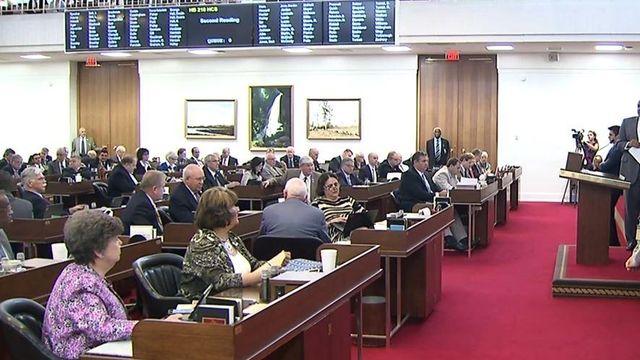Police body cameras still sensitive topic for lawmakers
Less than seven months after a state law restricting the release of footage from police body and dashboard cameras took effect, lawmakers once again engaged in a heated debate Thursday over who should have access to those videos.
Posted — UpdatedRep. John Faircloth, R-Guilford, who sponsored the original body camera law, which requires a court order for public release of videos, wanted to loosen those restrictions a bit to improve the operations of law enforcement agencies.
Under House Bill 797, body and dashboard camera video could be released without a court order within a law enforcement agency for training and to another agency for a joint investigation, and a "limited number of randomly selected still images" could be publicly released to help identify and capture a criminal suspect.
The bill also called for providing access to police videos to city managers to review the operations of their local department and, if a city council voted for it, to the full council or a citizens review board. Under those instances, the videos would have to be viewed in a closed-door session, and all members of the council or the review board would have to sign confidentiality agreements.
"A town council is not in the chain of command for the investigation and prosecution of a criminal matter," said Rep. Bill Brawley, R-Mecklenburg.
Granting access to police videos to a city council or review board would politicize whatever is depicted on those videos, Brawley said.
"People with an ax to grind will go to the press and give their viewpoints," he said, noting the bill didn't include any penalties for violating the confidentiality agreements.
"These are heated issues, and we know that a councilman or a mayor can give their opinion on what they saw or what they think they saw, and it can prejudice a jury pool or even worse," agreed Rep. Scott Stone, R-Mecklenburg.
Rep. Kelly Alexander, D-Mecklenburg, said lawmakers needed to respect local officials and believe they would be true to their word and abide by a confidentiality agreement.
The Charlotte City Council was harshly criticized last fall in the wake of a fatal police shooting, even though they had no access to police body camera footage of the incident, said Rep. Becky Carney, D-Mecklenburg.
"This continued for several weeks because we had no answers," Carney said, referring to violent protests in the immediate wake of the shooting, followed by days of public questions of city and police leaders.
"What happened in Charlotte, God forbid ever happens in any other city, but we need to be prepared," she said.
Rep. Elmer Floyd, D-Cumberland, noted that a city council would be on the hook for defending any lawsuit involving a police officer's actions, so they should know what happened.
After an hour of heated debate, Brawley's amendment to drop city councils and police review boards from the bill passed 59-57, and the revised bill easily cleared the House by a 109-7 margin.
Related Topics
• Credits
Copyright 2024 by Capitol Broadcasting Company. All rights reserved. This material may not be published, broadcast, rewritten or redistributed.






